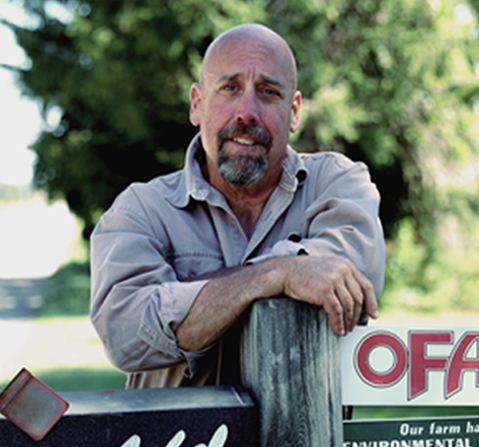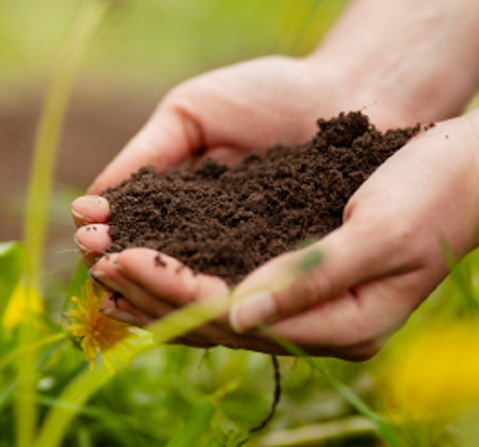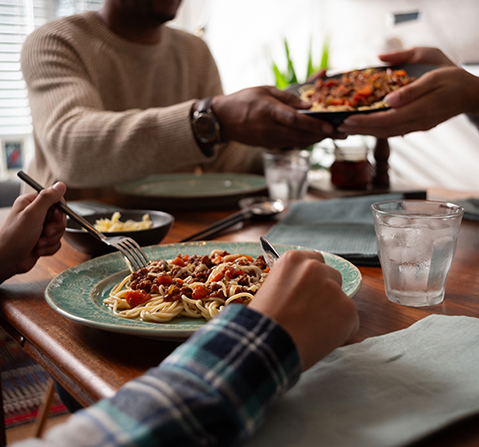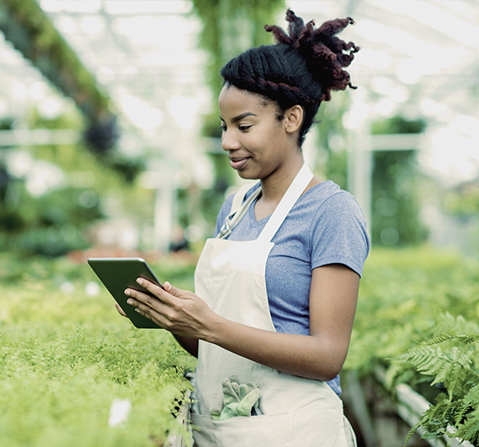Producer - Entrepreneur, ColdAcre, Whitehorse, Yukon.
Discover why Tarek and his team work for a sustainable future
Transcript
Oh, wow! That depends what day you ask. ColdAcre is a company that focuses on food systems in especially harsh climates. We have a few different aspects of the company, one is that we have our farm. Our farm is producing greens year round. And then we have winter harvest. We started off with winter harvest being just for our goods, but we soon realized that there were a lot of Yukoners producing a lot of great food, and we wanted to bring them in. And then we also have the food systems side where we will help communities design food systems similar to ones that we have, so that they can grow their food year round as well. One is the overall sustainability of our planet, and then the sustainability of our community. We've seen roads wash out and wildfires threaten them and mudslides so it only becomes more and more clear that we need to do this because the grocery stores empty out within two days. So we are producing food locally, we're hiring locally, but then the food has greater nutritional impact. Going to the store and seeing fresh greens. Coming home at the end of the day of work and seeing one of my delivery vans bringing food to my neighbour. We just get a lot of positive reactions. I love the people that I'm working with. We're making a difference. I'm really proud of that.
[Upbeat music begins.]
[A montage begins with the ColdAcre building, an aerial view of the Yukon River in Whitehorse and a staff member handling produce in a greenhouse.]
[Images move quickly, the screen divides into nine with images of the Whitehorse sign, a close-up view of produce, ColdAcre staff members handling produce, ending with a full screen of the Whitehorse welcome sign.]
Text on screen: Meet The People Behind Your Food
[Tarek Bos-Jabbar talks to the camera.]
Tarek Bos-Jabbar: Oh, wow! That depends what day you ask.
[Tarek stands outside with his arms crossed, looks and smiles to his right then turns to face the camera.]
Text on screen: Tarek Bos-Jabbar, Producer-Entrepreneur, Whitehorse, Yukon
Tarek: ColdAcre is a company that focuses on food systems in especially harsh climates.
[A montage includes an aerial view of the ColdAcre building, greenhouses within a large lot accompanied by vehicles and industrial buildings, an aerial view of parked cars, a person wiping snow off her windshield and a close-up view of the ColdAcre van with the company's logo on the side.]
We have a few different aspects of the company…
[A staff member scoops soil into containers that are positioned in a row on a table, then stacks the containers onto a shelf.]
… one is that we have our farm. Our farm is producing greens year-round.
[Two ColdAcre staff members pull a wagon as they walk outside towards the greenhouse.]
And then we have winter harvest.
[They package fresh lettuce in the greenhouse.]
We started off with winter harvest being just for our goods, but we soon realized that there were a lot of Yukoners…
[The staff members weigh the containers filled with lettuce on a scale and others inspect the produce in the greenhouse.]
… producing a lot of great food, and we wanted to bring them in.
[Tarek works at a computer with two staff members beside him, they analyze 3D models on the screen.]
And then we also have the food systems side where we will help communities design food systems…
[A montage begins with a close-up view of the produce in the greenhouse, a close-up view of a tube pouring water into a container with seedlings, a close-up views of seedlings in trays.]
… similar to ones that we have, so that they can grow their food year-round as well.
Text on screen: What does sustainable food production mean to you?
One is the overall sustainability of our planet,..
[A staff member sorts produce into individual bags and lays them out on a table and sticks a label on each bag. The labels read 'Mixed Microgreens'.]
… and then the sustainability of our community.
[The staff member drives the ColdAcre company van away from the camera, with a view of the city and the road ahead as they drive to their destination.]
We've seen roads wash out and wildfires threaten them and mudslides, so it only becomes more and more clear that we need to do this…
[The van pulls up in front of a customer's house and the staff member carries an a black ColdAcre bag to the front door and knocks.]
… because the grocery stores empty out within two days.
[A montage begins with a close-up view of a sign that has a list of meat for sale, a staff member works at a desk with a dog on their lap, and another member organizes a stack of company cards.]
So, we are producing food locally, we're hiring locally, but then the food has a greater nutritional impact.
Text on screen: What are you most proud of?
[Tarek points to a framed picture of a community greenhouse that he is holding up to the camera. Tarek holds a container filled with lettuce up to the camera.]
Going to the store and seeing fresh greens.
[Aerial views of the company building and the city along the Yukon River.]
Coming home at the end of the day of work…
[Cut to the back of the company van with the logo 'ColdAcre Food Systems' and in the background a staff member delivers an order to a customer at their front door.]
… and seeing one of my delivery vans bringing food to my neighbour. We just get a lot of positive reactions.
[Tarek laughs with his colleagues as they stand in a line and smile towards the camera.]
I love the people that I'm working with.
We're making a difference. I'm really proud of that.
[In the dark, a staff member pulls a wagon towards a greenhouse, opens the door and enters the bright light.]
Text on screen: Canadian farmers and agricultural businesses work to feed you and future generations. Discover how they are growing a better future. Canada.ca/Taste-the-Commitment
[Upbeat music comes to an end.]
Text on screen: Agriculture and Agri-Food Canada – Agriculture et Agroalimentaire Canada
[Government of Canada wordmark]
[End.]
Learn how Tarek and his team put sustainability into practice
Transcript
I'm part of a new generation that is working on sustainable changes, improving the local food system. But, you know, we built everything on the shoulders of giants. We're adding our own piece and we're making it unique. But we can't take all the credit. We have to acknowledge a lot of very smart people who work very hard for like, a thousand plus years. My name’s Tarek Bos-Jabbar. I'm the CEO of ColdAcre Food Systems. We are in Whitehorse, Yukon. We have consistent yields week after week, which is different from traditional agriculture. And this means that we can really plan for labour and for our sales and make a very consistent 1,000 pounds every single week. Our customers are typically Yukoners who really appreciate fresh food, fresh greens and things that were produced within 100 kilometers, mostly. I’d say that for the restaurant side of things, the fact that it's being harvested the day that we deliver it, I think makes a large difference. Our largest customer base is usually First Nation communities. They'll often buy a system or want to work with us in order to land a food system within their community, to increase the sustainability of their community, and job opportunities and overall contribute to something local. In 2021, we built a unit that went to Inuvik in the Northwest Territories. Now they are producing greens all year round in a place that was very far removed from anywhere that can produce greens. We're trying to look at the entire food systems for a community, not just one aspect. So when we design a food system for a northern community, we’ll think about the size of the community and what their goals are. And we'll size a system to make it so that they can effectively feed their community but not overproduce. When they buy a food system and deploy it into a community, we’ll bring whoever is going to operate it into ColdAcre, and they'll work on our farm for two weeks or however long it takes for them to get comfortable, so they know that they can operate their farm efficiently and effectively. We're proud to say that almost everything that comes out of our facility will be compostable in a proper facility. When you get a containerized hydroponic system like ourselves, we don't have to clear out a big section of land. In addition, the food is produced here. It doesn't need to be trucked in. We have organic waste, a bit of heat waste, and then we have a very, very small amount of water waste. Most of the water that gets pulled out of our systems comes out in our plants. We just have to flush out our reservoirs once every month or once every two months just to give them a nice clean. And other than that, we're not really having any waste. It's all being consumed.
[Upbeat music begins]
[A montage begins with the ColdAcre building, an aerial view of the Yukon River in Whitehorse and the Welcome to Whitehorse sign.]
I'm part of a new generation that is working on sustainable changes…
[A montage includes an aerial view of the snow covered ColdAcre buildings, surrounded by parked vehicles and steel container hydroponic growing unit. Two workers pull a wagon in the snow between as they walk towards the unit and enter while carrying boxes.]
…improving the local food system. But, you know, we built everything on the shoulders of giants.
[They package fresh lettuce in the growing unit.]
We're adding our own piece and we're making it unique. But we can't take all the credit.
[They fill containers with the packaged lettuce, weigh them on a scale and carry them out of the unit.]
We have to acknowledge a lot of very smart people who work very hard for like, a thousand plus years.
[Tarek Bos-Jabbar talks to the camera.]
Text on screen: Sustainable agriculture in action
[A fork and a shovel appear on either side of the title with a close-up of plants in the background.]
My name's Tarek Bos-Jabbar. I'm the CEO of ColdAcre Food Systems. We are in Whitehorse, Yukon.
Text on screen: Tarek Bos-Jabbar, Producer-Entrepreneur, Whitehorse, Yukon
[Tarek stands outside with his arms crossed, looks and smiles to his right then turns to face the camera.]
Text on screen: What's unique about your type of agriculture?
[A close-up view of seedlings in a tray.]
[A montage of a worker who scoops soil into growing trays in a row on a table.]
We have consistent yields week after week, which is different from traditional agriculture.
[A close-up view of a tube pouring water into a container with seedlings, a close-up view of seedlings in trays.]
[A worker sorts produce into individual bags, weighs the packaged produce on a scale and lays them out on a table and sticks a label on each bag. The labels read 'Mixed Microgreens'.]
And this means that we can really plan for labour and for our sales and make a very consistent 1000 pounds every single week.
Text on screen: Who is buying your fresh produce?
[The ColdAcre company van pulls up in front of a customer's house and the worker carries a black ColdAcre bag to the front door and knocks.]
Our customers are typically Yukoners who really appreciate fresh food, fresh greens and things that were produced within 100 kilometers mostly.
I'd say that for the restaurant side of things, the fact that it's being harvested the day that we deliver it, I think makes a large difference.
[The worker hands the bag to a smiling customer.]
[A close-up view of inside the greenhouse.]
Text on screen: Who is buying your food growing systems?
Our largest customer base is usually First Nation communities.
[A montage includes a close-up view of a hand drawing of a ColdAcre greenhouse, the inside of an empty greenhouse and a close-up view of wall mounted control pad.]
They'll often buy a system or want to work with us in order to land a food system within their community...
[The montage continues with images of the irrigation system, Tarek stands outside a growing unit, he shows two young people the inside of the greenhouse, a worker holds a seedling, another worker stands on a ladder in the greenhouse and smiles at the camera.]
...to increase the sustainability of their community and create job opportunities and overall contribute to something local.
[A transport truck crane lifts a white growing unit from the truck bed, places it next to the greenhouse.]
In 2021, we built a unit that went to Inuvik in the Northwest Territories.
[An aerial view of the small building and ColdAcre growing unit adjacent to other buildings.]
Now they're producing greens all year round in a place that was very far removed from anywhere that can produce greens.
[Two people pose on and next to a pickup truck with a large sign 'Welcome to Inuvik community greenhouse hydroponics' printed on the container greenhouse.]
Text on screen: How do you design the systems?
[Tarek works at a computer with two staff members beside him, they analyze 3D models of the interior of a growing unit on the screen.]
We're trying to look at the entire food systems for a community, not just one aspect.
So when we design a food system for a northern community, we will think about the size of the community and what their goals are. And we'll size the system to make it so that they can effectively feed their community but not overproduce.
[Two workers walk through a greenhouse filled with produce and inspect the plants on the shelf. One of them picks up a lettuce plant and inspects its roots.]
When they buy a food system and deploy it into a community, we'll bring whoever is going to operate it into ColdAcre, and they'll work on our farm for two weeks or however long it takes for them to get comfortable so they know that they can operate their farm efficiently and effectively.
[A view of the Yukon River in Whitehorse.]
Text on screen: What are the environmental impacts?
We're proud to say that almost everything that comes out of our facility will be compostable in a proper facility.
[A close-up view of a worker removing bottom leaves from fresh lettuce.]
When you get a containerized hydroponic system like ourselves, we don't have to clear out a big section of land.
[A montage begins with a view of the produce in the greenhouse, a close-up view of a pipe pouring water into a container and a worker drives the ColdAcre van along a snowy road.]
In addition, the food is produced here. It doesn't need to be trucked in.
[A view of the town and the road ahead... An aerial view of the town along the Yukon River.]
We have organic waste, a bit of heat waste and then we have a very very small amount of water waste.
[An aerial view of the greenhouses within a large lot surrounded by vehicles and snow-covered industrial buildings.]
Most of the water that gets pulled out of our systems comes out in our plants.
[A worker harvests fresh lettuce off the shelf in the greenhouse and carries crates full of produce outside of the greenhouse, places the crates on a wagon.]
We just have to flush out our reservoirs once every month or once every 2 months just to give them a nice clean.
[A close-up view of a pipes pouring water into a container. A view of the ColdAcre building.]
And other than that, we're not really having any waste. It's all being consumed.
[Tarek smiles and holds a container filled with lettuce up to the camera.]
[In the dark, a worker pulls a wagon through the snow towards a shipping container / growing unit, opens the door and enters the bright light.]
Text on screen: Canadian farmers and agricultural businesses work to feed you and future generations.
Text on screen: Discover how they are growing a better future. Canada.ca/Taste-the-Commitment
[Upbeat music ends]
Text on screen: Agriculture and Agri-Food Canada - Agriculture et Agroalimentaire Canada
[Government of Canada wordmark]
[End]







